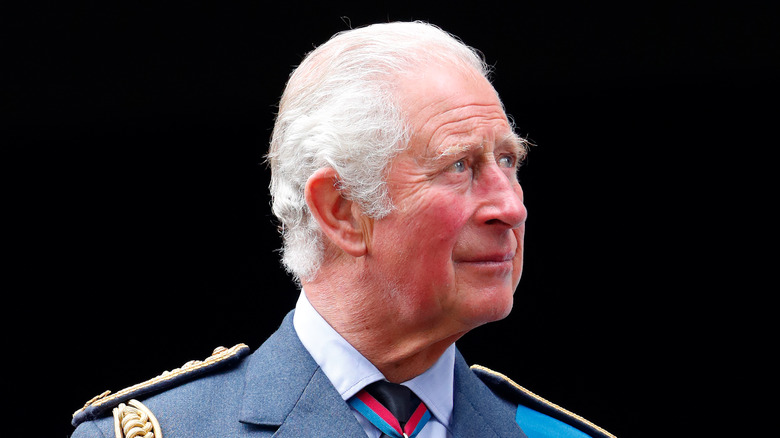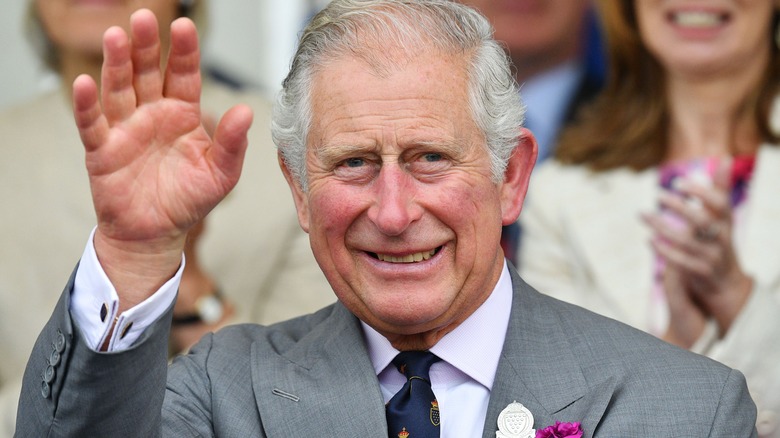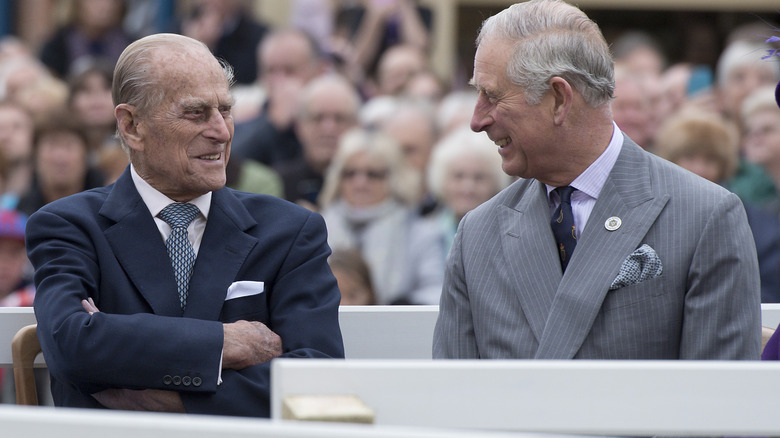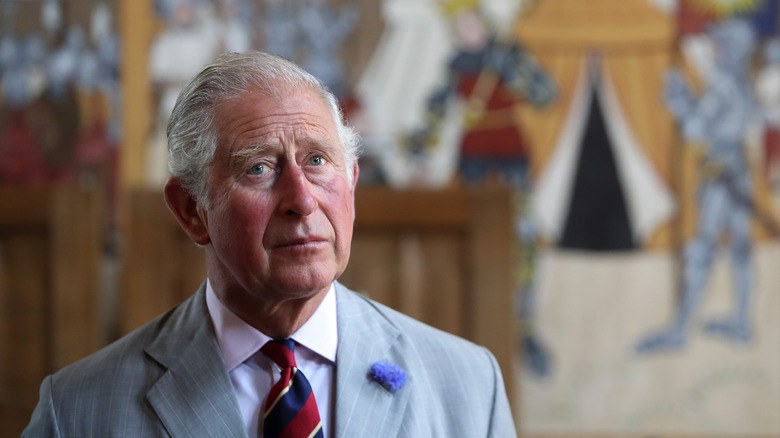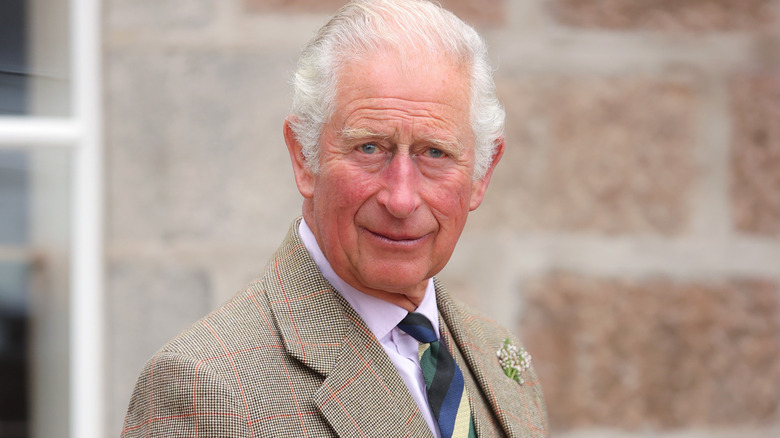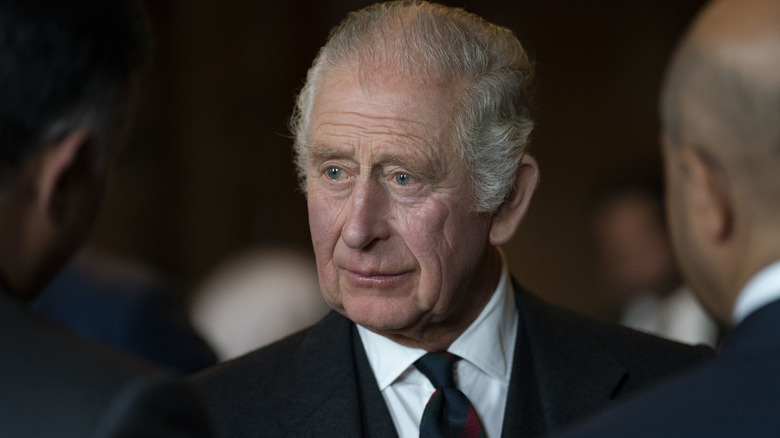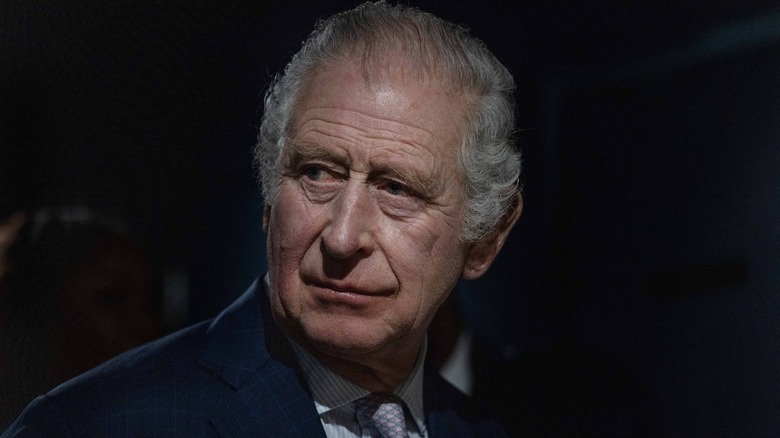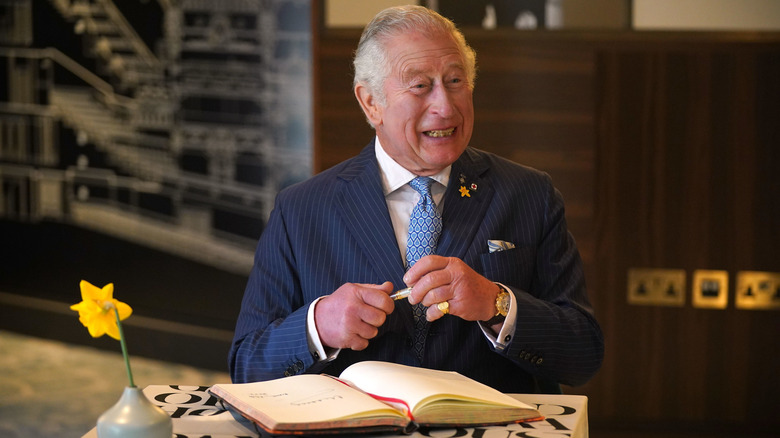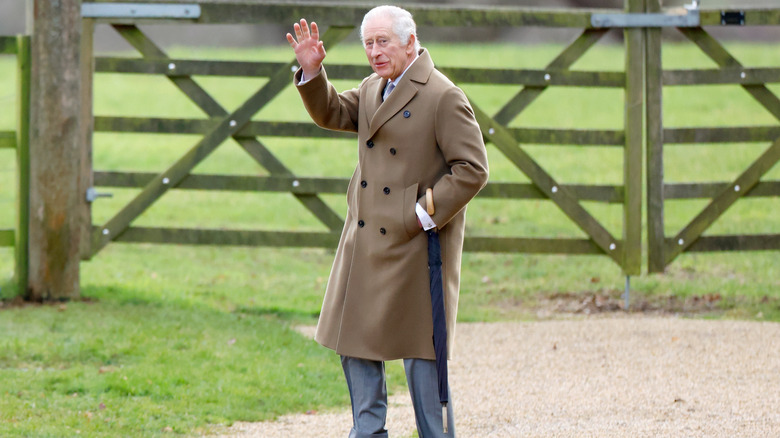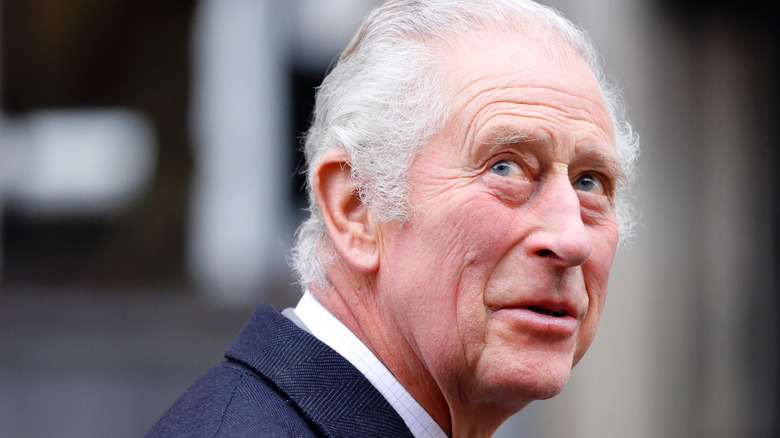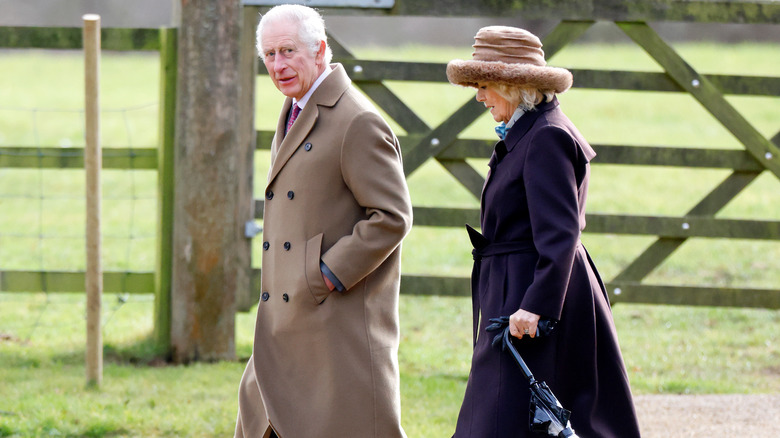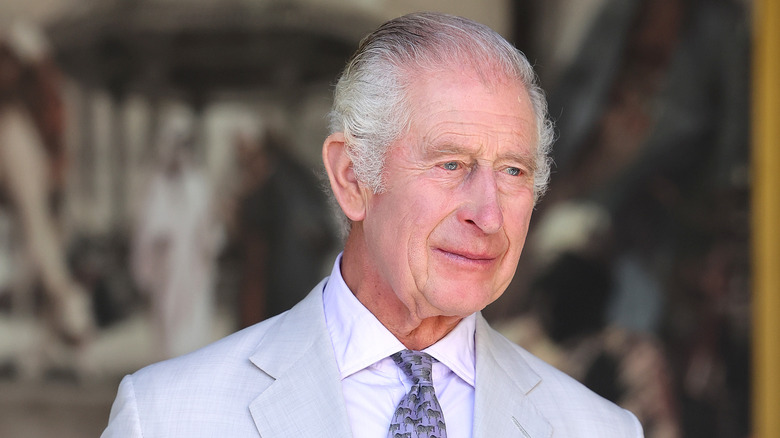Benign Prostatic Hyperplasia: All About The Health Condition That Put King Charles III In The Hospital
Buckingham Palace might be notorious for trying to keep the secrets of the royals who walk its hallowed halls, but recently, its new monarch, King Charles III, opened up to the public about a corrective procedure he would be undergoing to treat an enlarged prostate. This marked the new monarch's first public health concern since he became the new king.
Naturally, royal pundits were concerned about King Charles' health, but the palace assured the public that the monarch's condition was benign. In the medical world, Charles' diagnosis is known as benign prostatic hyperplasia. This is not exactly something men discuss in casual conversation, and yet, it's incredibly common. According to the NIH, if you're a man between the ages of 51 and 60, you can rest assured that 50% of your peers deal with this condition. In men who are 80 and older, that number rises to 90%. Maybe it should be something men discuss more often, and now that Charles has been so open about his diagnosis, that might just start happening more frequently.
A palace source told ABC News that the king hoped sharing his diagnosis would raise more awareness, and we'd say he was successful. The NHS' webpage on prostate enlargement saw a 1,061% uptick in visitors the day after the king announced his diagnosis. According to a palace statement posted to X (formerly Twitter), Charles is pretty chuffed that he managed to raise awareness. In that spirit, let's take a closer look at his diagnosis.
Charles likely dealt with very uncomfortable symptoms
Symptoms of benign prostatic hyperplasia can be wildly unpleasant. This condition develops when the prostate gland, which resembles the size of a walnut, starts to get bigger. This is something that naturally happens as men get older. Because the prostate is located close to the urethra (the tube that's responsible for excreting sperm and urine), it can affect the tube's ability to function optimally, causing a blockage that can lead to a vast array of uncomfortable symptoms.
While we of course don't know what symptoms King Charles III experienced, there's a chance he dealt with urinary incontinence (when urine leaks from the urethra), difficulty with the process of urinating, urgent trips to the bathroom at all hours, and pain while urinating or ejaculating. Cleveland Clinic notes that some people also notice changes in the color of their urine as well as a foul smell. This is all thanks to the prostate blocking the flow of urine from the urethra. These are not exactly the kind of symptoms anyone wants to deal with, and once you start noticing these changes, it's good to follow Charles' lead and contact your doctor so they can do a full assessment and recommend treatments.
Certain conditions put you at risk of developing benign prostatic hyperplasia
Benign prostatic hyperplasia might be very common, but there are certain conditions that can make you more likely to develop an enlarged prostate. In King Charles III's case, his age was the most likely risk factor. According to the Mayo Clinic, it's rare for men to deal with benign prostatic hyperplasia at a young age; men who are 40 and older have an increased risk of developing the condition. Those who have a family history of benign prostatic hyperplasia are also more likely to develop it. It's not publicly known whether Charles' father, the late Prince Philip, was ever diagnosed with an enlarged prostate. The Duke of Edinburgh was hospitalized for a serious bladder infection in 2012, but the cause was never made known. An enlarged prostate can lead to a bladder infection, so there is a possibility that it runs in the family, but since we don't know what the cause of Philip's infection was, this is mere speculation.
Men who have been diagnosed with heart disease or diabetes also have a higher risk of developing an enlarged prostate. Obesity is another risk factor. Charles is not obese, but it isn't known whether the king has any other underlying health conditions like heart disease or diabetes. The most likely cause of his diagnosis, therefore, was his age or his family history.
Charles likely received swift treatment to prevent more severe symptoms
When dealing with benign prostatic hyperplasia, it's important to seek treatment as soon as you notice any symptoms. While the symptoms in themselves can be pretty debilitating already, leaving them untreated can result in even more painful complications. With the royal family having a team of doctors at their disposal, it's likely King Charles III got swift treatment after his diagnosis to prevent any complications — and it's a good thing if he did, too.
According to the Mayo Clinic, leaving benign prostatic hyperplasia untreated can result in a slew of painful and potentially dangerous conditions, including urinary retention. Urinary retention, which is also a symptom of benign prostatic hyperplasia and can increase in severity if there's a lack of treatment, can lead to hospitalization, where a catheter then needs to be inserted into the urethra to drain the trapped urine. Urinary retention can create other issues, including kidney damage. This happens due to the pressure the trapped urine exerts on these organs. If a bladder infection occurs because of urinary retention, it can also spread to the kidneys.
Naturally, the bladder can also sustain some damage: when it's not emptied completely on a regular basis, this can lead to an overall weaker bladder. Additionally, bladder stones can form, which can impact the urine and even lead to illness. Unsurprisingly, UTIs are also a complication to contend with when the bladder can't properly empty itself.
Benign prostatic hyperplasia is fairly easy to diagnose
We common folks might not have a team of doctors at our beck and call like King Charles III, but thanks to benign prostatic hyperplasia being so common, doctors have developed several methods to swiftly diagnose and treat the condition, which means you can get a quick diagnosis without much fuss even if you're not the king of England. Chief Medical Officer and Physician at One Oak Medical, Jason Singh, M.D., told The List exclusively that screening for benign prostatic hyperplasia is pretty straightforward. "[It] typically involves a blood test called prostate-specific antigen (PSA) and/or digital rectal exam," Singh said.
The NHS notes that your doctor might also ask you about your liquid intake and the status of your urine. You should also tell them if you've experienced any leakage recently. Aside from the digital rectal exam Singh mentioned, your doctor might opt to do a physical rectal exam, a blood test that analyzes the function of your kidneys, or a urinary flow test. If necessary, an ultrasound can also be utilized to generate more information about your prostate.
Causes of benign prostatic hyperplasia
Benign prostatic hyperplasia might be a very common condition, but its root cause is still shrouded in mystery. In men under the age of 40, an enlarged prostate is incredibly rare, but when it does occur, Chief Medical Officer and Physician at One Oak Medical, Jason Singh, M.D., says that genetics are often to blame. Inflammation of the prostate and hormone imbalances can also cause an enlarged prostate in younger men.
When it comes to older men like King Charles III, Singh says that there are a few possible causes. "Obesity and sedentary activity can increase risk of developing BPH. As such I recommend for my patients to make healthy lifestyle choices to reduce risk of BPH," Singh told The List. This includes regular physical activity and eating a healthy diet. "Some studies show that high stress, alcohol, and smoking is a risk factor — so counseling against these is important," Singh added.
Other theories include decreasing levels of testosterone or, in some cases, an increase in dihydrotestosterone (a stronger form of testosterone). Cleveland Clinic notes that there are concerns regarding whether or not testosterone supplements can exacerbate benign prostatic hyperplasia.
Charles' diagnosis does not put him at an increased risk of developing prostate cancer
When King Charles III first shared his diagnosis with the world, the palace assured the public that, while the monarch was indeed receiving a corrective procedure for an enlarged prostate, his condition was benign. Still, many wondered whether the king's diagnosis put him at an increased risk of cancer in the future.
"Enlarged prostate (benign prostatic hyperplasia, BPH) does not directly increase the risk of developing prostate cancer," Chief Medical Officer and Physician at One Oak Medical, Jason Singh, M.D.," told The List. "However, both conditions are common in aging men and can coexist," he added. As Singh explains it, men experience increased estrogen levels as they age while testosterone levels start to decline. This hormonal imbalance can lead to cells starting to multiply abnormally. "Regular screenings are important for prostate health," Singh stresses. "Current guidelines state to have a shared discussion with your doctor for men between 45-69 or sooner at 40 if deemed high risk, such as African American or those with a family history of prostate cancer."
Charles has, however, been diagnosed with an undisclosed form of cancer
Barely a week after King Charles III was discharged from the hospital after undergoing a procedure for benign prostatic hyperplasia, Buckingham Palace released a statement to inform the public that, while the king was in surgery, doctors discovered something else. "During The King's recent hospital procedure for benign prostate enlargement, a separate issue of concern was noted. Subsequent diagnostic tests have identified a form of cancer," the statement read. The palace was not forthcoming regarding the type of cancer the doctors discovered but from the statement, it may be fair to deduce that King Charles' cancer diagnosis is not related to his enlarged prostate.
Despite the grim diagnosis, the palace said that Charles is optimistic and has already started to undergo treatment. "He looks forward to returning to full public duty as soon as possible," the statement read. "His Majesty has chosen to share his diagnosis to prevent speculation and in the hope it may assist public understanding for all those around the world who are affected by cancer," the statement concluded.
In some cases, benign prostatic hyperplasia can be treated with medication
While King Charles III underwent surgery for his benign prostatic hyperplasia, it's not the only course of treatment. In some cases, doctors will prescribe medication first to see if it works to resolve a patient's symptoms.
Speaking to The List exclusively, male fertility expert and urologist Justin J. Houman, M.D., explained that drugs like alpha-blockers and 5-alpha reductase inhibitors are the most common treatments associated with benign prostatic hyperplasia. Alpha-1 blockers work by relaxing the prostate and the bladder neck, which can help urine flow more easily. Penn Medicine notes that these drugs can take some time to work, however — patients usually start to see improvement within a week. It's possible the king used medication first and that it was unsuccessful in treating his symptoms.
5-alpha reductase inhibitors like finasteride and dutasteride are also common treatments, but it can take between three to six months before you see the results. These drugs inhibit hormone production, which can cause the prostate to reduce in size. While this helps to ease symptoms associated with an enlarged prostate, these medications also have some unwanted side effects, like erectile dysfunction.
Mild symptoms might resolve with lifestyle changes
We've already established that you won't necessarily need surgery if you are diagnosed with benign prostatic hyperplasia, and depending on the severity of your symptoms, you might not even need medication. While King Charles III wasn't this lucky and had to go under the knife, male fertility expert and urologist Justin J. Houman, M.D., says that's not necessarily everyone's case. "Many men with mild symptoms choose to simply monitor their condition," Houman told The List. "Sometimes, making lifestyle changes can alleviate symptoms without the need for medical intervention," he explained.
Just because you can monitor your condition yourself (if your doctor gave the go-ahead), it doesn't mean you should forfeit regular checkups at your GP or urologist. "It's crucial for those with prostatic hyperplasia to have regular check-ups to monitor the progression of the condition," Houman stressed.
Penn Medicine adds that changing some habits can also ease symptoms. For instance, if you usually tend to postpone trips to the bathroom, start doing the opposite. It also can help to create a set schedule for bathroom visits and stick to it. Incorporating more exercise and physical activity into your daily routine can be beneficial, and cutting down on caffeine and alcohol consumption can also yield positive results.
King Charles III likely had one of the following surgical procedures
When King Charles III was diagnosed with benign prostatic hyperplasia, he was likely presented with several surgical options, and his doctor would have made a recommendation as to which one was the best fit. Speaking to The List, male fertility expert and urologist Justin J. Houman, M.D., explained that procedures for an enlarged prostate vary from minimally invasive to advanced therapies, and there are a couple that the king probably considered, the most common and least invasive of which is the transurethral resection of the prostate (TURP). "[This is] a gold standard for significant symptoms," Houman said. If the king needed more advanced treatment, he might have considered some of the newer treatments available. "Laser therapy or prostatic urethral lift could also be considered, especially if they align with the king's lifestyle and medical needs," Houman explained.
Houman added that another possible option could have been robot-assisted surgery. This procedure is very effective and has a much shorter recovery time. "This could be a fitting choice for someone of [Charles'] stature, ensuring a swift return to royal engagements," he said. Another surgical option the king might have been presented with is embolization. Houman explained that this surgery is aimed at reducing the size of the prostate. "[It blocks] blood flow to specific areas of the prostate, potentially aligning with a preference for treatments with shorter recovery periods."
Recovery can take time and there is a risk of long-term complications
Once King Charles III was released from the hospital, royal pundits and the press alike wanted to know how he was doing, and it appears they had nothing to worry about: The king looked dapper as he left the London Clinic, and male fertility expert and urologist Justin J. Houman, M.D., told The List that, depending on the procedure Charles had, it was likely relatively painless. "Most modern treatments for prostatic hyperplasia are designed to minimize pain. Procedures like TURP or laser therapy are performed under anesthesia, ensuring comfort during the procedure," Houman explained. As for recovery time, Houman said it depends on various factors. "For minimally invasive procedures, patients might return to normal activities within a few days to a week. More extensive surgeries might require a few weeks for complete recovery." It is understood that Charles will be taking a month off royal duties to recuperate, so it's likely his procedure was of the more extensive sort.
As with any surgery, the procedures that exist for benign prostatic hyperplasia could lead to complications. Houman explained that urinary incontinence and sexual dysfunction are the most common side effects. The former is rarely permanent. Sexual dysfunction symptoms can range from ejaculation problems to erectile dysfunction, but Houman reiterated that this isn't a given and depends on the type of surgery you get. Re-treatment might also be needed later on since surgery can't prevent the prostate from growing again.
When to see a doctor
We get it: unlike King Charles III, you don't have an in-house team of doctors you can consult when you suspect something might be off, but it's imperative you make the trip to your GP if you're experiencing worrisome symptoms. Penn Medicine recommends you contact your doctor if you notice that your urine amount has decreased or if you struggle with emptying your bladder. If you experience any chills or a fever, notice pus or blood when you urinate, or have persistent stomach, back, or side pain, that's a surefire sign that you need to pay a visit to your doctor as soon as possible.
It's important to know that some medications can also cause urinary problems. This includes antidepressants, diuretics, sedatives, and antihistamines. If you suspect that one of these medications might be the culprit, contact your doctor immediately. You should also make an appointment if you've already been diagnosed with benign prostatic hyperplasia but haven't found relief from symptoms after two months of the prescribed treatment.
All of this to say, if you suspect you might be dealing with an enlarged prostate, don't hesitate to speak to your doctor. If the king of England has the guts to reveal it to the whole world, the least we commoners can do is get ourselves checked out.
